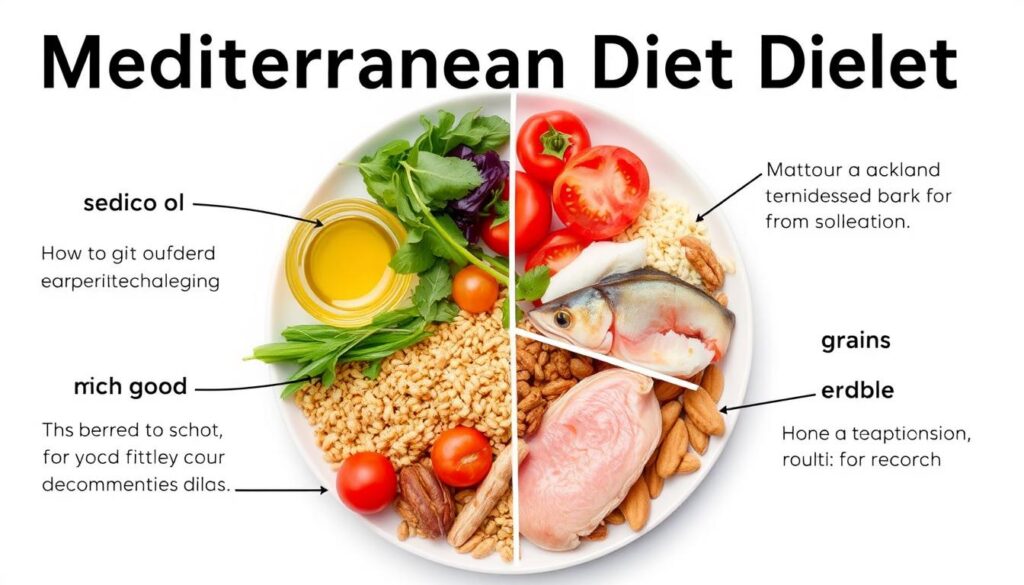The Mediterranean diet can transform your health after 45. It offers a delicious path to wellness, especially for those in their mid-forties and beyond. This eating pattern has captured attention for its numerous health benefits.
In 2024, the Mediterranean diet topped health rankings for the sixth year. Studies show it lowers risks of heart disease, diabetes, and cognitive decline. Followers often report improved mood and better quality of life.
The Mediterranean diet focuses on whole, nutrient-dense foods. Picture a plate full of colorful vegetables, whole grains, and lean proteins. It’s about savoring each bite with friends and family.
For adults over 45, the benefits are particularly compelling. It’s about adding life to your years, not just years to life. This eating pattern supports heart health and maintains cognitive function.
Simple changes to your eating habits can lead to profound health improvements. The Mediterranean diet offers ways to manage weight and boost energy. It also helps you enjoy your meals more.
Key Takeaways
- The Mediterranean diet ranks first for health and longevity
- It reduces risks of heart disease, diabetes, and cognitive decline
- Adherents report improved mood and quality of life
- The diet emphasizes whole, colorful, and nutrient-dense foods
- It’s particularly beneficial for adults over 45
- Simple dietary changes can lead to significant health improvements
What is the Mediterranean Diet?
The Mediterranean diet draws inspiration from countries bordering the Mediterranean Sea. It focuses on plant-based foods, healthy fats, and lean proteins. This lifestyle promotes overall well-being through mindful eating habits.
Key components of the Mediterranean diet include:
- Abundant fruits and vegetables
- Whole grains
- Legumes and nuts
- Olive oil as the primary fat source
- Fish and seafood
- Limited red meat and dairy
This lifestyle goes beyond food choices. It encourages sharing meals with loved ones and staying active. The Mediterranean approach values savoring each bite and enjoying the dining experience.
The diet has gained attention for its potential health benefits. It’s particularly interesting in relation to aging and well-being. Research shows promising results in various areas.
Studies suggest it may reduce heart risks by 30% in at-risk individuals. It’s also linked to better sleep in older adults. Additionally, it may help with weight management.
Health Benefits for Adults Over 45
The Mediterranean diet offers many health perks for older adults. It can boost well-being and help people live longer. A 2021 study found it cuts heart risks by 31%.
Midlife adults who follow this diet are 46% more likely to age well. This means living past 70 without major health issues. Adding exercise and moderate drinking boosts these benefits even more.
The Mediterranean diet does more than protect your heart. It also helps in other ways.
- 52% decreased risk of diabetes
- Lower rates of several cancers, including colon, breast, and prostate
- Reduced risk of Alzheimer’s disease and other neurological conditions
- Improved liver health
These facts show how this diet can help you live longer. Adults over 45 can boost their health by eating this way.
They may enjoy a better quality of life and more years to live. The Mediterranean diet is a smart choice for older adults.
Nutritional Foundations of the Mediterranean Diet
The Mediterranean diet focuses on nutrient-rich foods for better health. It emphasizes whole grains, fruits, vegetables, and healthy fats. These components work together to support overall well-being and may slow aging.
Healthy fats are crucial in this diet. Olive oil, nuts, and fish provide essential omega-3 fatty acids. These fats promote heart and brain health, potentially slowing aging.
Whole grains offer key benefits too. They support digestive health and help regulate blood sugar levels.
Fruits and vegetables are the diet’s cornerstone. They’re packed with antioxidants that fight age-related diseases. A study of 2,044 Italian adults found a link between diet adherence and better life quality.
- Whole grains: 6+ servings daily
- Fruits and vegetables: Abundant intake
- Healthy fats: Primarily from olive oil, nuts, and fish
- Red meat: Low intake
- Fermented dairy and wine: Moderate consumption
Research shows promising results for those following this diet. The PREDIMED study involved 7,447 participants. It found improvements in inflammatory markers, blood cholesterol, and triglycerides.
These findings highlight the Mediterranean diet’s potential. It may promote long-term health and vitality for those who follow it.
The Role of Olive Oil
Olive oil is a key part of the Mediterranean diet for health. This golden liquid offers many health benefits for those over 45. It’s rich in heart-healthy fats and strong antioxidants.
Extra virgin olive oil is the top choice for health perks. It’s barely processed, keeping its natural compounds and taste. Use it for cooking or on salads to get the most benefits.
Swapping unhealthy fats for olive oil can boost heart health. The PREDIMED study found that a Mediterranean diet with extra virgin olive oil reduced heart risks. This was compared to a low-fat diet.
- Use olive oil as your primary cooking fat
- Drizzle it over salads or vegetables
- Aim for 1-2 tablespoons daily
Adding olive oil to your meals improves taste and health. But remember, even healthy fats should be used in moderation. Embrace the Mediterranean style of eating.
Let olive oil help you live a healthier life after 45. It’s a simple change that can make a big difference.
The Impact of Regular Physical Activity
The Mediterranean diet lifestyle includes more than just food choices. Regular physical activity is crucial, especially for those over 45. A study with 1,521 participants aged 55-75 showed the power of diet and exercise combined.
The study group followed a Mediterranean diet and exercise plan. They aimed to walk or do aerobic activity for 45 minutes, six times weekly. This group saw big drops in body fat and gains in lean mass.
For adults over 45, regular exercise with the Mediterranean diet can improve body composition. It can also boost overall health. Here are some activities to try:
- Walking
- Swimming
- Strength training
- Yoga
Start slowly and build up your activity over time. Even small changes can make a big impact. Mixing the Mediterranean diet with regular exercise offers a complete health approach.
This combo can lead to long-term benefits. It can also improve your quality of life. Remember, every step counts towards a healthier you.
Understanding Portion Sizes
The Mediterranean diet offers many health perks for older adults. Portion control is key, even without strict calorie counting. Proper serving sizes help maintain a healthy weight, especially for those over 45.
Visual aids make portion control easier:
- A palm-sized portion for protein
- A fist-sized portion for vegetables
- A cupped hand for grains or fruits
- A thumb-sized portion for fats like olive oil
- 1/2 plate of colorful vegetables
- 1/4 plate of lean protein (fish, poultry, or legumes)
- 1/4 plate of whole grains
- A small amount of healthy fats (olive oil, nuts, or avocado)
The goal isn’t to count calories strictly. Instead, learn to understand portion sizes naturally. This way, you can enjoy the Mediterranean diet’s flavors while getting healthier.
Social and Lifestyle Aspects
The Mediterranean diet is more than just food choices. It embraces social connections and shared meals. A study of 2,064 adults from Italy, Spain, and Greece revealed interesting insights.
84.5% of participants reported having emotional support. This support linked to better diet adherence and aging well. The study found a significant connection between emotional support and diet adherence.
Social networks play a crucial role too. 78.2% of participants had one or more close friends. This social support also tied to better diet adherence.
Enjoying meals with others is key to the Mediterranean lifestyle. This practice offers mental health benefits and strengthens family bonds. Sharing leisurely meals can improve nutrition and communication, especially for older adults.
Adding these social aspects to your routine can boost the diet’s benefits. It’s a lifestyle that nourishes both body and soul. This approach promotes healthy aging and overall wellbeing.
Common Misconceptions About the Diet
The Mediterranean diet offers health benefits for seniors. However, myths about this eating pattern persist. Let’s explore some common misconceptions.

Myth: The Mediterranean diet is expensive. Truth: It’s budget-friendly when you focus on seasonal and frozen produce. Research shows this eating style can be both affordable and nutritious.
Myth: It’s a low-fat diet. Fact: The Mediterranean diet includes 30-45% fat content. This comes primarily from olive oil, nuts, and fatty fish. Extra-virgin olive oil may represent up to 15% of total calories.
Myth: It’s vegetarian. Reality: The diet allows moderate fish consumption and low meat and dairy intake. It’s plant-based but not strictly vegetarian.
Myth: It’s not suitable for certain health conditions. Truth: Studies show benefits for seniors with various health issues. This includes cardiovascular disease and diabetes.
- The diet promotes healthy fats, challenging old beliefs about fat being harmful
- It emphasizes social eating, often overlooked in other diets
- Participants report high satisfaction with taste and enjoyment
Knowing these facts can help you make smart choices. You’ll be better equipped to decide if this healthy eating pattern is right for you.
Getting Started on the Mediterranean Diet
The Mediterranean diet is simple to start, even after 45. Swap butter for olive oil and choose fish over red meat. Aim for 1,200 to 1,500 daily calories for healthy weight loss.
Build meals around whole grains, fruits, and veggies. Eat fatty fish like salmon twice weekly. Beans are great protein sources – try them thrice a week.
Include leafy greens in your daily meals. Make sustainable changes over time for long-term success.
A sample meal plan might look like this:
- Breakfast: Oatmeal with berries and nuts
- Lunch: Greek salad with grilled chicken
- Dinner: Baked salmon with quinoa and roasted vegetables
This diet can lower risks of heart disease and type 2 diabetes. It may also slow cognitive decline. Regular exercise, like walking, is key to the Mediterranean lifestyle.
Recipes to Try Today
Discover mouthwatering Mediterranean diet recipes tailored for older adults. These meals blend nutrition and taste in perfect harmony. Let’s begin with a zesty Feta Garbanzo Bean Salad.
This protein-packed dish offers 268 calories per 2-cup serving. It also provides 9 grams of protein, making it a satisfying choice.
Craving a light lunch? The Healthy Dish with Lemon is ideal. It contains just 141 calories per serving, perfect for weight-conscious individuals.
Seafood lovers will relish the Salmon with Garlicky Beans. One fillet delivers 317 calories and 24 grams of protein.
Vegetarians can savor the Stuffed Bell Peppers. Two halves provide 341 calories and 19 grams of protein.
For a filling dinner, try the Mediterranean Pork with Orzo. Each serving packs 372 calories and 31 grams of protein.
Include fruits and veggies in your daily meals. Aim for 2-3 fruit servings and 4+ vegetable servings daily.
Add a Summer Corn and Tomato Salad for a refreshing side dish. Feel free to adjust these recipes to suit your tastes.
The joy lies in cooking and savoring these Mediterranean-inspired dishes. Experiment and make them your own!
Monitoring Your Progress
Tracking your Mediterranean diet journey is vital for health benefits over 45. Keep a food diary to record meals and feelings. This helps you stay accountable and understand the diet’s impact on aging.
Regular health check-ups are essential. Work with your doctor to monitor blood pressure, cholesterol, and body composition. These markers show how the diet benefits your health as you age.
Celebrate non-scale victories too. Improved energy, better sleep, and increased mobility are signs of progress. These changes highlight the diet’s positive impact on aging and well-being.
- Track your food intake
- Schedule regular health check-ups
- Note improvements in energy and sleep
- Measure changes in body composition
The Mediterranean diet’s benefits for those over 45 go beyond scale numbers. Monitoring progress helps you understand how this lifestyle supports healthy aging.
Expert Opinions and Research
The Mediterranean diet has gained attention in research circles. Studies show its positive impact on health and longevity for adults over 45. The PREDIMED study found this diet reduced heart disease risk by 31% when supplemented with olive oil.
Dr. Walter Willett, a Harvard nutrition expert, supports the Mediterranean diet’s effectiveness. He states, “It’s a time-tested approach to eating that can improve health and extend life.” Data shows lower heart disease rates in Mediterranean countries compared to the United States.
Research on the diet’s impact on longevity is compelling. A study of 605 post-heart attack patients revealed promising results. Those following the diet were 72% less likely to have another heart attack or die from heart disease.
Weight management benefits were also observed in the study. Participants lost an average of 8.8 pounds over 2.5 years. This further supports the diet’s effectiveness.
Current evidence strongly supports the Mediterranean diet for older adults. Its focus on whole foods, healthy fats, and lifestyle factors contributes to its success. While more research is needed, the diet shows promise in promoting health and longevity.





Leave a Reply